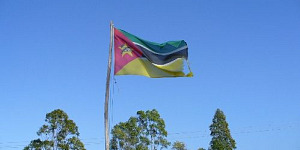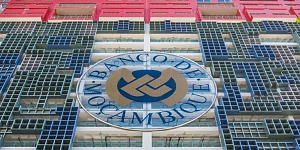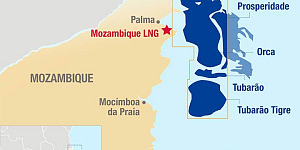Fitch Ratings has downgraded Mozambique's Long-term foreign and local currency Issuer Default Ratings (IDR) to 'B' from 'B+'. The Outlook is Stable. The Country Ceiling has also been revised down to 'B' from 'B+'. Fitch has affirmed Mozambique's Short-term IDR at 'B'.
KEY RATING DRIVERS
The downgrade of Mozambique's Long-term IDRs reflects the following key rating drivers and their relative weights:
MEDIUM
Mozambique's fiscal profile has deteriorated sharply over the past year, reflecting high budget deficits, a rapid rise in public debt, volatile government revenue and a widening wage bill. Mozambique's new government is making efforts to rein in capital expenditure but fiscal consolidation is expected to be gradual, highlighting in part difficulties in increasing the tax base. Although persistent under-spending on capital projects means that fiscal deficits will be lower than budgeted, Fitch expects the general government deficit to average 5.8% of GDP in 2015-17, well above the 3.6% average in 2011-13.
Government debt has continued to rise rapidly as a result of high financing needs and the 40% depreciation of the metical in the first nine months of 2015 (around 80% of total public debt is denominated in foreign currency). Fitch expects government debt/GDP to reach a 10-year high of 61.6% in end-2015 (compared to 37.6% in 2011), before falling modestly in 2016-17 on the back of strong nominal growth. However, increased borrowing by state owned entities (SOEs), on which there is limited transparency, and the potential use of state guarantees represent important risks to our forecasts. On the upside, interest costs remain relatively low, at 4.8% (compared with the 'B' median of 7.4%), as around 60% of government debt is contracted on concessional terms.
The country's institutional framework, including public finance management, remains very weak. The government is looking to increase fiscal transparency, partly by establishing better debt risk analysis. However, limited progress has been achieved so far and major challenges persist, in particular the restructuring of EMATUM, the state-owned tuna company which issued a USD850m bond in 2013. Although the government remains committed to honour the obligations of EMATUM, there is less clarity on the financial prospects of the company and potential fiscal liabilities to the sovereign.
Low global commodity prices are putting pressure on Mozambique's external accounts and foreign reserve position. Although exports fell only modestly in 1H15 (by 4.4% year on year, highlighting a relatively diversified export base compared with other commodity producers in Africa), foreign direct investment (FDI) contracted by 22% in the same period. The development of the liquefied natural gas (LNG) sector remains the main driver of FDI, but investment in other areas such as mining is rapidly reducing given the weak price outlook of coal and other minerals.
Lower FDI inflows and continued currency intervention by the Central Bank of Mozambique to smooth exchange rate volatility has led to a sharp fall in foreign reserves from USD3bn at end-2014 to USD 2.3bn in September. Fitch expects foreign reserves to pick up modestly in 2016-17 (providing close to three months of CXP cover) but there are downside risks tied to the performance of FDI. In the event of renewed pressure on reserves, the government would be forced to reduce capital expenditure further (to limit import growth) or allow for a greater depreciation of the metical, both of which would affect macroeconomic performance. Net external debt is high at a projected 140% of GDP at end-2015 and is projected to widen further, but most of it is accounted for by intercompany loans from large foreign investors, reducing the risks to the sovereign.
Mozambique's 'B+' IDRs also reflect the following key rating drivers:
Despite a modest deceleration in GDP growth in 1H15 (6.2% versus 6.8% in 1H14), medium-term economic prospects remain positive, underpinned by strong investment growth, a rising labour force and the development of vast natural gas resources. The weak performance of the mining sector is partly being offset by strong growth in agriculture, transport, utilities and services, which will continue to benefit from broad macroeconomic stability. In this context, Fitch expects GDP growth to average 6.6% in 2015-17, well above the 'B' median of 4.5%. Lower oil prices have raised some risks to the development of LNG facilities, but at present there is little indication that key investors are pulling out of projects.
The sharp depreciation of the metical had limited effects on inflation and confidence indicators in 1H15. However, headline inflation had risen to 2.7% in September and is likely to continue rising gradually over the short term. The authorities have started to tighten monetary policy to contain inflationary pressures, although its effect is likely to be limited given weak transmission mechanisms. Inflation should average around 5% in 2016-17 assuming that international food and fuel prices remain relatively subdued and there is no widespread flooding in the country.
Mozambique's banking sector remains broadly stable, supported by a strong capital position and high profitability (return on equity stood at 20.3% in August 2015) in line with robust credit growth. However, there are some risks that a slowing economy, exchange rate volatility and weak external demand will hinder lending growth and increase non-performing loans. Exposure to SOEs constitutes an important risk and has already led to an increase in NPLs at some institutions.
Political tensions have risen following renewed skirmishes between the FRELIMO government and the opposition former rebel group RENAMO. This has reduced the scope to reach a political compromise on key issues such as decentralisation. Although RENAMO does not have the capability to pose a major security threat to the country, it could create sporadic violence that could potentially deter foreign investment.
Low per capita income and human development indicators are below the 'B' median and a major constraint on the rating. Weak data quality is also a rating weakness.
RATING SENSITIVITIES
The main factors that, individually or collectively, could lead to negative rating action are:
-Failure to consolidate the budget deficit leading to a rise in government debt/GDP, or the discovery of additional contingent liabilities.
-Sustained low commodity prices that jeopardise the development of the LNG sector and erode external debt sustainability.
-A return to violence that undermines the business environment and has a detrimental impact on exports and investment.
-A sharp fall in foreign reserves.
The main factors that could lead to positive rating action are:
- Fiscal consolidation, leading to a decline in government debt/GDP.
-Improved investor confidence in the development of natural resource sectors leading to a stronger external position.
-Effectively tackling structural weaknesses, including improving the business environment and providing stable growth to lift income per capita.
KEY ASSUMPTIONS
The rating and Outlook are sensitive to a number of assumptions:
-Fitch expects Brent oil prices to average USD55/b in 2015, USD60/b in 2016 and USD70/b in 2017.
-There is no return to civil war.






































